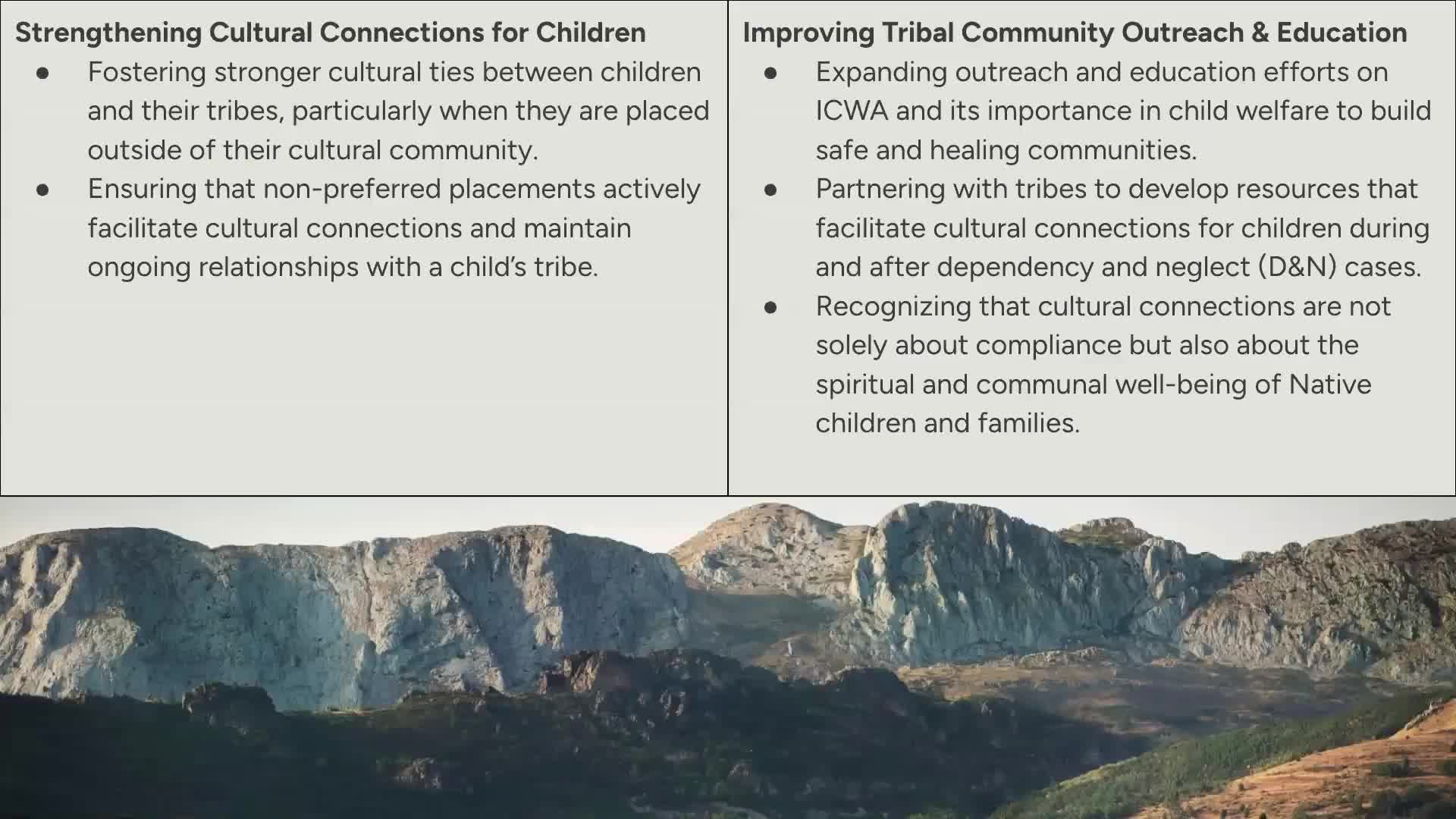Montana ICWA community urges formal pathways for cultural connections, resource guides for foster placements
Get AI-powered insights, summaries, and transcripts
Subscribe
Summary
Facilitator Ashley Chaney McNeil opened the final Caring Wisdom Forward meeting and the community finalized imperatives aimed at strengthening cultural connections for Native children in out-of-home care, including formal cultural agreements for foster families and tribe-specific resource guides.
Facilitator Ashley Chaney McNeil opened the final Caring Wisdom Forward community-of-practice meeting by reiterating the group’s purpose: to foster culturally humble collaboration among people involved in and affected by ICWA to preserve and empower Indian families and their cultural ties.
The community identified strengthening cultural connections for children as one of two top priorities and drafted a set of practical imperatives the group intends to share with agencies and partners. Participants emphasized concrete steps such as developing formal cultural‑agreement pathways for foster families; creating accessible resources that connect children to language, ceremonies and crafts; centering family voices in planning; and avoiding pan‑Indian assumptions that treat culture as a checkbox rather than an ongoing relationship.
"The reason why we created and continued to cultivate this community of practice was to foster meaningful, culturally humble collaboration," said Ashley Chaney McNeil, the meeting facilitator. That framing underpinned the group’s conversation about how to operationalize cultural connections in everyday child welfare practice.
Speakers gave multiple examples of what those pathways could look like. Sheldon, reporting for the cultural‑connections breakout, said the group urged ensuring extended‑family contact (grandparents, cousins, birthday gatherings) and "must develop pathways for families to learn and connect to language, values, ceremonies, and crafts." The group also counseled against treating culture as a monolith and urged centering the family’s own articulation of culture.
Several participants proposed tools to make cultural connections practical for caseworkers and caregivers. Lana suggested a tribal-specific cultural resource book or handbook listing local celebrations, points of contact, age-appropriate cultural activities, and language resources for foster families and state workers. The group discussed making such a guide a cooperative project rather than placing the full burden on tribal staff.
Lisa, who identified herself as a child’s attorney, described taking on parts of this work in individual cases and recommended compiling age‑appropriate reading lists and remote language options to keep children connected when they live off reservation. "Having some kind of collaboration so it's not burdensome to the tribe, but developing something like that would be very helpful," she said.
Joan gave a courtroom example of case-level advocacy: she monitored visits, helped draft a parenting plan and documented visits so a judge could see that family-based care was working. The judge’s response, Joan said, illustrated how organized documentation and advocacy can preserve family ties and keep children connected to culture.
The group’s suggested imperatives focused on: 1) creating culturally specific agreements for placements that outline expectations and access to language and ceremonial participation; 2) producing tribe‑level resource guides for foster families and agency workers; 3) expanding remote and in-person language and cultural programming for children off reservation; and 4) centering family voice in decision making and avoiding pan‑Indian generalizations.
Ashley closed by saying the meeting notes and cleaned imperatives will be posted to the COP/CIP website and distributed to partner offices for follow-up.
